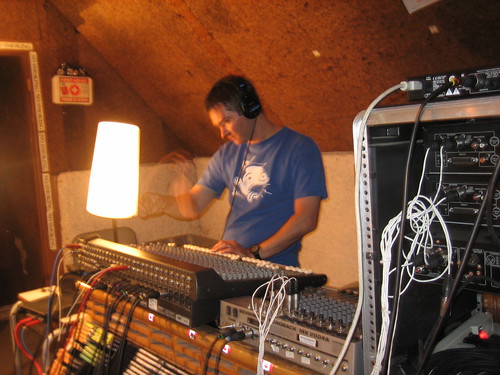The Black Fred Astaire
This is what Darondo calls himself, I kid you not. He told me "Do you know those Fred Astaire/Ginger Rogers movies? Man, they knocked me out! I could move like that! I'm the black Fred Astaire!"
My piece on San Fran's long-lost soul man came out today in Exclaim magazine. As usual, I was faced with the task of condensing a lifetime of experiences into 300 words. Of those, the usual questions and backgrounding had to be addressed: "Who is this guy? What's the new record all about?". Fortunately, here in blogland, one hyperlink can answer those questions.
If you're into rare funk, hip hop or reggae, it's all about the records, the labels, the people they worked with etc. It's not about their marriage, or their day jobs, or anything that doesn't fit the too-linear perspective of the music historian. What was most interesting about Darondo was his life "working outside of music". That phrase, used for example to describe Ornette Coleman's stint as an elevator operator during the 50s, implies that a musician upped and died, then was reanimated at some later date. It denies the influence that time or headspace has on the development of one's music. But you can't talk to Darondo without getting to know him as a delightful human being who's been around many blocks in his long and eccentric life, and he's about music through and through.
The man only cut three singles, mostly cause it seemed like the thing to do at the time, and he had the cash to do it. From the 60s to the 80s, he was just having fun being a player, always out for a good time, always hustling (totally legit gigs, he swears) and always singing and playing guitar. Heck, he broke out in song four times over the course of the interview, including a rendition of "Like A Virgin". He talked more about the use of music in his decade and a half as a physical therapist than about any stage shows. Music just flows through him, and some of it made it to the studio. It ended up being highly collectible and now he's back after several years of involuntary retirement from the rigours of physical therapy. He can't say if he's going to put together a band or play any shows to support the album; he's never done that sort of thing before. Let My People Go is a wonderful disc which will be on many best of 2006 lists - maybe we should just leave it at that.
He ought to be an inspiration to those who would reduce music to a series of products and corporate expectations.
My piece on San Fran's long-lost soul man came out today in Exclaim magazine. As usual, I was faced with the task of condensing a lifetime of experiences into 300 words. Of those, the usual questions and backgrounding had to be addressed: "Who is this guy? What's the new record all about?". Fortunately, here in blogland, one hyperlink can answer those questions.
If you're into rare funk, hip hop or reggae, it's all about the records, the labels, the people they worked with etc. It's not about their marriage, or their day jobs, or anything that doesn't fit the too-linear perspective of the music historian. What was most interesting about Darondo was his life "working outside of music". That phrase, used for example to describe Ornette Coleman's stint as an elevator operator during the 50s, implies that a musician upped and died, then was reanimated at some later date. It denies the influence that time or headspace has on the development of one's music. But you can't talk to Darondo without getting to know him as a delightful human being who's been around many blocks in his long and eccentric life, and he's about music through and through.
The man only cut three singles, mostly cause it seemed like the thing to do at the time, and he had the cash to do it. From the 60s to the 80s, he was just having fun being a player, always out for a good time, always hustling (totally legit gigs, he swears) and always singing and playing guitar. Heck, he broke out in song four times over the course of the interview, including a rendition of "Like A Virgin". He talked more about the use of music in his decade and a half as a physical therapist than about any stage shows. Music just flows through him, and some of it made it to the studio. It ended up being highly collectible and now he's back after several years of involuntary retirement from the rigours of physical therapy. He can't say if he's going to put together a band or play any shows to support the album; he's never done that sort of thing before. Let My People Go is a wonderful disc which will be on many best of 2006 lists - maybe we should just leave it at that.
He ought to be an inspiration to those who would reduce music to a series of products and corporate expectations.


2 Comments:
DD,
Nice piece in Exclaim but 1) S.F. is not Darondo's hometown. He grew up in Berkeley and recorded in Oakland; as far as I know, he never lived in San Francisco. 2) Ubiquity got its start in SF but it's been in Los Angeles now for about five years.
thanks for the compliment, and the fact-checking!
Post a Comment
<< Home